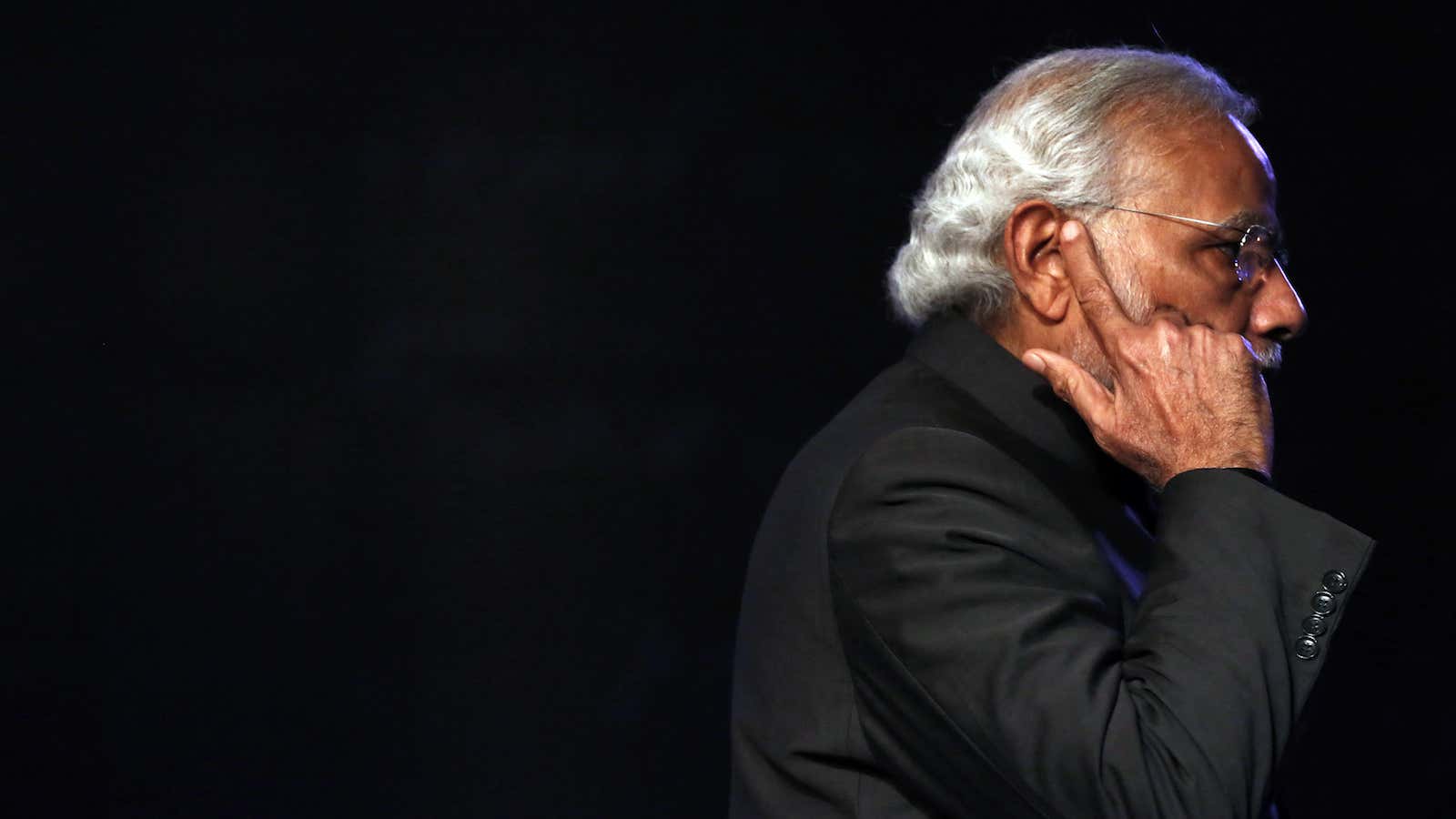Investors in India have always been wary of the country’s unclear tax policies.
But all that was set to change when Narendra Modi assumed power in May last year. In the run up to the election, Modi—widely perceived to be pro-business—was critical about tax policies holding back investments in India.
“We shouldn’t take decisions with retrospective effect,” Modi said in 2014 about the previous government’s decision to tax companies on a retrospective basis. “We need to create confidence in our system, which such decisions defeat.”
Now, nearly a year after assuming power, Modi’s credibility as the pro-reform face of India is at stake. Over the past month and a half, India’s tax authorities have sent notices for immediate payment of taxes to companies and investors. The recipients of these notices claim the government’s demands are unfair and arbitrary.
The story so far
On March 10, the Indian government decided to pursue $3.3 billion (Rs20,560 crore) as tax from India’s largest private sector oil producer, Cairn India.
Cairn India is owned by Vedanta group, which is controlled by India’s 46th richest man, Anil Agarwal.
In 2007, Cairn India had allegedly failed to deduct withholding tax on capital gains made by its former parent, Cairn Energy Plc, during a transfer of assets ahead of its initial public offering. After eight years, India wants the company to cough up that money. The country has also sought $1.6 billion (Rs10,000 crore) from Cairn Energy as tax dues in the case.
The oil company has decided to pursue the matter legally and taken the government to court over the claims.
On April 5, the Indian government sent tax notices to as many as 100 foreign institutional investors (FIIs) in the country, demanding $8 billion (Rs49,844 crore) as minimum alternate taxes (MAT).
The following day, tax authorities demanded $92 million (Rs573 crore) from chocolate maker, Cadbury, now Mondelez International. The tax department has claimed that Cadbury provided inaccurate information while claiming tax exemptions.
“This development has caught everyone by surprise and is extremely worrying for foreign investors,” Patrick Pang, managing director at Asia Securities Industry & Financial Markets Association in Hong Kong told Reuters. ”It suggests that the Indian government can come out at any time and re-clarify what was believed to be an established tax policy on foreign investments.”
All these demands by authorities, made barely a month after the Modi government presented its first full budget, has investors concerned. India had announced that it would stop slapping retrospective taxes from 2015.
Defiant Jaitley
However, finance minister Arun Jaitley seems defiant, and has said that the government is not pursuing a policy of tax terrorism. Instead, India is only seeking what companies and investors legitimately had to pay.
“Our fairness has been partly misunderstood,” Jaitley said on April 7. “The converse of tax terrorism is not a tax haven. Let it be clearly understood that India is not so vulnerable that every legitimate tax demand can be considered as tax terrorism, because we are not a tax haven and we don’t intend to be one.”
But the recent incidents have also kicked up a storm about the return of retrospective tax regime. India is trying to bring down its fiscal deficit to 3.9% this year and retrospective taxation, introduced in 2012, was widely perceived to help cut the deficit.
The government has also said that the notices that were slapped on Cairn were carried forward from the previous government. “As far as earlier notices and legacy issues are concerned,” Jaitley said in London last month, “they’ll have to be sorted out through a due judicial process. We’ve stuck to that word.”
Since the Modi government came to power, it had decided not to pursue two cases relating to Vodafone Plc and Shell. It took the decisions after the Bombay high court had ruled in favour of the companies.
The UK-based telecom major Vodafone was facing tax claims totalling more than $2 billion (Rs12,000 crore), while Shell was asked to pay $1 billion (Rs6,000 crore) in dues.
FIIs worried
Meanwhile, the tax demand on FIIs has also caused havoc among investors.
Jaitley had in his budget proposed to exempt MAT for foreign investors from the current financial year that started in April. MAT is levied on firms that rake in profits and pay dividends, but are not under the ambit of income tax payments due to various exemptions and deductions.
The Indian government has sent notices to institutional investors for dues pending up to fiscal year 2011-12. It has asked companies to pay 20% as MAT on capital gains made in those years.
Foreign investors, meanwhile, have been demanding that the exemption be given from previous years, which the government has refused.
“This attempt to apply and levy MAT to income and capital gains earned by FIIs/FPIs (foreign portfolio investors) would have several implications for both foreign funds and the investment of foreign investors in India,” the European Fund and Asset Management Association wrote to the finance ministry.
India has now asked the woeful investors to take legal course to sort out the matter. ”FII income is exempt from MAT with effect from April 1, 2015,” Shaktikanta Das, India’s revenue secretary, said on April 7. ”The government has already amended the law to provide for prospective exemption and has made it clear that legal recourse is open to the FPIs.”
And as matters now goes to courts, it is only likely that the issue could take longer to be resolved. And in that, Modi’s once indisputable image of a pro-business leader could take a heavy beating.
